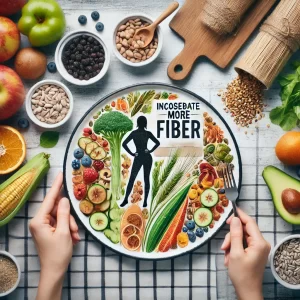The Anti-Inflammatory Diet for Weight Loss: A Step-by-Step Guide for Beginners
Introduction to the Anti-Inflammatory Diet
The Anti-Inflammatory Diet is designed to reduce chronic inflammation in the body, which is linked to a wide range of health problems, including weight gain, metabolic disorders, heart disease, and diabetes. By focusing on whole, nutrient-dense foods that naturally fight inflammation, the Anti-Inflammatory Diet not only supports weight loss  but also promotes overall health and well-being.
but also promotes overall health and well-being.
Chronic inflammation is often caused or exacerbated by the modern diet, which is high in processed foods, refined sugars, and unhealthy fats. These foods trigger an inflammatory response in the body, leading to weight gain, insulin resistance, and other health issues. The Anti-Inflammatory Diet seeks to reverse these effects by emphasizing foods rich in antioxidants, omega-3 fatty acids, fiber, and other nutrients that reduce inflammation and promote healing.
This guide will explore how the Anti-Inflammatory Diet works, its benefits for weight loss, and practical tips for incorporating anti-inflammatory foods into your daily meals.
How the Anti-Inflammatory Diet Works for Weight Loss
The Anti-Inflammatory Diet promotes weight loss by focusing on whole, unprocessed foods that reduce inflammation, improve digestion, and stabilize blood sugar levels. By eliminating pro-inflammatory foods, such as processed snacks, refined carbohydrates, and unhealthy fats, and replacing them with anti-inflammatory foods, the body can function more efficiently, burning fat and reducing excess weight.
Whole, Nutrient-Dense Foods
The Anti-Inflammatory Diet emphasizes whole, minimally processed foods like fruits, vegetables, whole grains, nuts, seeds, and fatty fish. These foods are naturally low in calories but high in fiber, vitamins, minerals, and healthy fats. By filling your plate with nutrient-dense, anti-inflammatory foods, you can reduce your overall calorie intake while promoting fat loss and improving your overall health.
Rich in Omega-3 Fatty Acids
Omega-3 fatty acids are a key component of the Anti-Inflammatory Diet. These healthy fats, found in fatty fish like salmon and sardines, as well as flaxseeds, chia seeds, and walnuts, help reduce inflammation in the body and support weight loss. Omega-3s have been shown to improve metabolic health, regulate insulin levels, and promote fat burning, making them an essential part of any weight loss plan.
Reduces Insulin Resistance
Many pro-inflammatory foods, such as refined sugars and processed carbohydrates, contribute to insulin resistance—a condition in which the body’s cells become less responsive to insulin, leading to weight gain and an increased risk of diabetes. The Anti-Inflammatory Diet helps reduce insulin resistance by eliminating these foods and replacing them with fiber-rich, low-glycemic options that stabilize blood sugar levels and promote healthy metabolism.
Supports Gut Health
A healthy gut microbiome is essential for reducing inflammation and supporting weight loss. The Anti-Inflammatory Diet includes foods rich in prebiotics and probiotics, such as leafy greens, onions, garlic, yogurt, and  fermented foods. These foods help balance the gut bacteria, improve digestion, and enhance nutrient absorption, all of which contribute to a healthier, leaner body.
fermented foods. These foods help balance the gut bacteria, improve digestion, and enhance nutrient absorption, all of which contribute to a healthier, leaner body.
Key Components of the Anti-Inflammatory Diet
The Anti-Inflammatory Diet focuses on incorporating foods that naturally reduce inflammation while avoiding those that contribute to it. Here are the key components:
- Fruits and Vegetables: Fresh, colorful fruits and vegetables are rich in antioxidants, vitamins, and fiber. Leafy greens, berries, tomatoes, and citrus fruits are especially beneficial for reducing inflammation and promoting weight loss.
- Whole Grains: Unlike refined grains, whole grains such as quinoa, brown rice, oats, and barley are high in fiber and have a low glycemic index, helping to stabilize blood sugar levels and reduce inflammation.
- Fatty Fish: Salmon, mackerel, sardines, and other fatty fish are excellent sources of omega-3 fatty acids, which reduce inflammation and support heart health.
- Nuts and Seeds: Almonds, walnuts, flaxseeds, chia seeds, and hemp seeds are packed with healthy fats and antioxidants that help fight inflammation and promote weight loss.
- Healthy Fats: Olive oil, avocado, and coconut oil provide anti-inflammatory benefits and are great alternatives to unhealthy fats like trans fats and refined vegetable oils.
- Herbs and Spices: Turmeric, ginger, garlic, and cinnamon are powerful anti-inflammatory agents that add flavor to meals while reducing inflammation in the body.
Benefits of the Anti-Inflammatory Diet for Weight Loss and Health
The Anti-Inflammatory Diet offers numerous benefits for weight loss and overall health. Here’s how it can positively impact your body:
1. Reduces Inflammation
The Anti-Inflammatory Diet is specifically designed to reduce chronic inflammation in the body, which is linked to obesity, insulin resistance, and other metabolic disorders. By reducing inflammation, the diet helps  your body function more efficiently, leading to improved fat burning and weight loss.
your body function more efficiently, leading to improved fat burning and weight loss.
2. Promotes Stable Blood Sugar Levels
The diet focuses on low-glycemic, fiber-rich foods that help regulate blood sugar levels and prevent spikes and crashes. Stable blood sugar levels are essential for controlling hunger, reducing cravings, and supporting long-term weight management.
3. Supports Heart Health
The Anti-Inflammatory Diet is rich in omega-3 fatty acids, antioxidants, and fiber, all of which support cardiovascular health. By reducing inflammation and improving cholesterol levels, the diet can help lower the risk of heart disease while promoting weight loss.
4. Encourages Mindful Eating
Unlike restrictive diets that focus on cutting calories or eliminating entire food groups, the Anti-Inflammatory Diet encourages mindful eating and balance. By focusing on whole, nourishing foods, you can enjoy your meals while making choices that support your health and weight loss goals.
5. Improves Gut Health
The diet’s emphasis on fiber-rich, prebiotic foods supports a healthy gut microbiome, which plays a key role in digestion, immune function, and metabolism. A healthy gut can help reduce inflammation, improve nutrient absorption, and support weight loss.
Potential Drawbacks of the Anti-Inflammatory Diet
While the Anti-Inflammatory Diet offers many benefits, it’s important to be aware of potential challenges:
1. Requires Meal Preparation
Because the Anti-Inflammatory Diet focuses on whole, unprocessed foods, it often requires more time for meal preparation and cooking. This can be challenging for individuals with busy schedules. However, meal prepping in advance can make the diet easier to follow.
2. Restricts Some Popular Foods
The Anti-Inflammatory Diet eliminates many common foods, such as processed snacks, refined sugars, and unhealthy fats. This can be difficult for individuals who are used to eating these foods regularly. However, there are plenty of delicious and satisfying alternatives available within the diet.
Tips for Success on the Anti-Inflammatory Diet
To get the most out of the Anti-Inflammatory Diet and achieve your weight loss goals, follow these practical tips:
1. Fill Your Plate with Colorful Vegetables
Vegetables are rich in antioxidants, fiber, and essential nutrients. Be sure to include a wide variety of colorful vegetables in your meals, such as leafy greens, bell peppers, tomatoes, and carrots. These foods are low in calories but high in nutrition, making them ideal for weight loss and inflammation reduction.
2. Focus on Healthy Fats
Healthy fats, such as those found in olive oil, avocados, nuts, and seeds, are an important part of the Anti-Inflammatory Diet. These fats help reduce inflammation, promote satiety, and support overall health. Include a source of healthy fat in each meal to keep you full and satisfied.
3. Choose Whole Grains over Refined Carbs
Refined carbohydrates, such as white bread and sugary snacks, can spike blood sugar levels and promote inflammation. Instead, choose whole grains like quinoa, brown rice, and oats, which are higher in fiber and help stabilize blood sugar levels.
4. Include Omega-3-Rich Foods
Fatty fish like salmon, sardines, and mackerel are excellent sources of omega-3 fatty acids, which reduce inflammation and support weight loss. Aim to include fatty fish in your diet at least twice a week, or consider plant-based sources like flaxseeds and chia seeds if you follow a vegetarian or vegan diet.
5. Add Anti-Inflammatory Spices to Your Meals
Spices like turmeric, ginger, and garlic are powerful anti-inflammatory agents. Adding these spices to your meals not only enhances flavor but also boosts the anti-inflammatory benefits of your diet.
Scientific Evidence and Case Studies
Numerous studies have shown that reducing chronic inflammation through dietary changes can support weight loss and improve overall health. Research published in the Journal of Nutrition found that individuals who followed an anti-inflammatory diet experienced significant weight loss and improvements in metabolic health, including better blood sugar control and reduced insulin resistance.
Additionally, a study in the journal Circulation found that diets rich in anti-inflammatory foods, such as fruits, vegetables, and fatty fish, were associated with a lower risk of heart disease and improved weight management. These findings suggest that the Anti-Inflammatory Diet can be an effective tool for both weight loss and long-term health.
Who Should Try the Anti-Inflammatory Diet?
The Anti-Inflammatory Diet is a great option for individuals who:
- Want to reduce chronic inflammation and improve overall health.
- Are looking for a plant-based, whole-foods approach to weight loss.
- Prefer a flexible diet that allows for a wide variety of foods.
- Are interested in improving gut health and reducing the risk of chronic diseases.
Who Should Avoid the Anti-Inflammatory Diet?
The Anti-Inflammatory Diet may not be suitable for individuals who:
- Prefer a more structured eating plan, such as calorie counting or portion control.
- Have difficulty preparing home-cooked meals or prefer processed, convenience foods.
- Are allergic to or intolerant of certain anti-inflammatory foods, such as nuts, seeds, or fish.
Conclusion
The Anti-Inflammatory Diet is a plant-based, whole-foods approach that promotes weight loss by reducing chronic inflammation in the body. By focusing on nutrient-dense foods like fruits, vegetables, whole grains, and healthy fats, you can achieve your weight loss goals while improving your overall health. With the right meal planning and commitment, the Anti-Inflammatory Diet can help you achieve sustainable weight loss and better well-being.